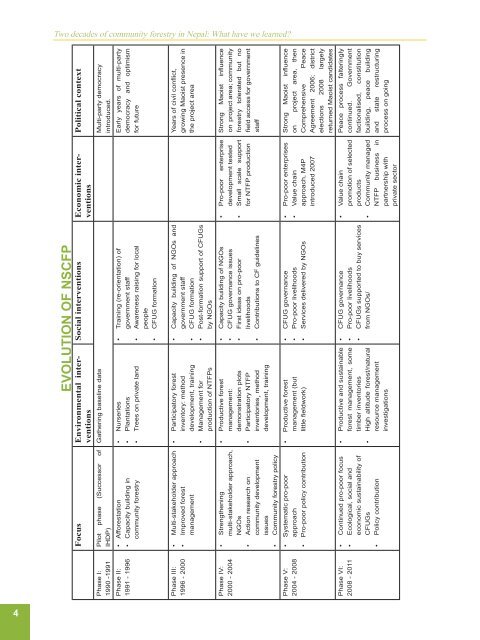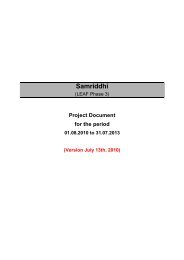Two decades of community forestry in Nepal: What have we learned?
Two decades of community forestry in Nepal: What have we learned?
Two decades of community forestry in Nepal: What have we learned?
Create successful ePaper yourself
Turn your PDF publications into a flip-book with our unique Google optimized e-Paper software.
<strong>Two</strong> <strong>decades</strong> <strong>of</strong> <strong>community</strong> <strong>forestry</strong> <strong>in</strong> <strong>Nepal</strong>: <strong>What</strong> <strong>have</strong> <strong>we</strong> <strong>learned</strong>?<br />
Phase I:<br />
1990 -1991<br />
Phase II:<br />
1991 - 1996<br />
Phase III:<br />
1996 - 2000<br />
Phase IV:<br />
2000 - 2004<br />
Phase V:<br />
2004 - 2008<br />
Phase VI:<br />
2008 - 2011<br />
Focus Environmental <strong>in</strong>terventions<br />
Pilot<br />
IHDP)<br />
phase (Successor <strong>of</strong><br />
• Afforestation<br />
• Capacity build<strong>in</strong>g <strong>in</strong><br />
<strong>community</strong> <strong>forestry</strong><br />
Social <strong>in</strong>terventions Economic <strong>in</strong>terventions<br />
Political context<br />
Gather<strong>in</strong>g basel<strong>in</strong>e data Multi-party democracy<br />
<strong>in</strong>troduced.<br />
• Nurseries<br />
• Plantations<br />
• Trees on private land<br />
EVOLUTION OF NSCFP<br />
• Tra<strong>in</strong><strong>in</strong>g (re-orientation) <strong>of</strong><br />
government staff<br />
• Awareness rais<strong>in</strong>g for local<br />
people<br />
• CFUG formation<br />
Early years <strong>of</strong> multi-party<br />
democracy and optimism<br />
for future<br />
• Multi-stakeholder approach<br />
• Improved forest<br />
management<br />
• Participatory forest<br />
<strong>in</strong>ventory: method<br />
development, tra<strong>in</strong><strong>in</strong>g<br />
• Management for<br />
production <strong>of</strong> NTFPs<br />
• Capacity build<strong>in</strong>g <strong>of</strong> NGOs and<br />
government staff<br />
• CFUG formation<br />
• Post-formation support <strong>of</strong> CFUGs<br />
by NGOs<br />
Years <strong>of</strong> civil conflict,<br />
grow<strong>in</strong>g Maoist presence <strong>in</strong><br />
the project area<br />
• Strengthen<strong>in</strong>g<br />
multi-stakeholder approach,<br />
NGOs<br />
• Action research on<br />
<strong>community</strong> development<br />
issues<br />
• Community <strong>forestry</strong> policy<br />
• Systematic pro-poor<br />
approach<br />
• Pro-poor policy contribution<br />
• Cont<strong>in</strong>ued pro-poor focus<br />
• Ecological, social and<br />
economic susta<strong>in</strong>ability <strong>of</strong><br />
CFUGs<br />
• Policy contribution<br />
• Productive forest<br />
management:<br />
demonstration plots<br />
• Participatory NTFP<br />
<strong>in</strong>ventories¸ method<br />
development, tra<strong>in</strong><strong>in</strong>g<br />
• Productive forest<br />
management (but<br />
little fi eldwork)<br />
• Productive and susta<strong>in</strong>able<br />
forest management, some<br />
timber <strong>in</strong>ventories<br />
• High altitude forest/natural<br />
resource management<br />
<strong>in</strong>vestigations<br />
• Capacity build<strong>in</strong>g <strong>of</strong> NGOs<br />
• CFUG governance issues<br />
• First ideas on pro-poor<br />
livelihoods<br />
• Contributions to CF guidel<strong>in</strong>es<br />
• CFUG governance<br />
• Pro-poor livelihoods<br />
• Services delivered by NGOs<br />
• CFUG governance<br />
• Pro-poor livelihoods<br />
• CFUGs supported to buy services<br />
from NGOs/<br />
•<br />
Pro-poor enterprise<br />
development tested<br />
• Small scale support<br />
for NTFP production<br />
• Pro-poor enterprises<br />
• Value cha<strong>in</strong><br />
approach, M4P<br />
<strong>in</strong>troduced 2007<br />
• Value cha<strong>in</strong><br />
promotion <strong>of</strong> selected<br />
products<br />
• Community managed<br />
NTFP<br />
bus<strong>in</strong>ess <strong>in</strong><br />
partnership with<br />
private sector<br />
Strong Maoist <strong>in</strong>fluence<br />
on project area; <strong>community</strong><br />
<strong>forestry</strong> tolerated but no<br />
field access for government<br />
staff<br />
Strong Maoist <strong>in</strong>fluence<br />
on project area, then<br />
Comprehensive Peace<br />
Agreement 2006; district<br />
elections 2008 largely<br />
returned Maoist candidates<br />
Peace process falter<strong>in</strong>gly<br />
cont<strong>in</strong>ued. Government<br />
factionalised, constitution<br />
build<strong>in</strong>g, peace build<strong>in</strong>g<br />
and state restructur<strong>in</strong>g<br />
process on go<strong>in</strong>g<br />
4

















